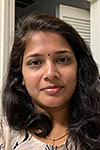UHV Discovers series to showcase research on artificial intelligence
The University of Houston-Victoria’s second UHV Discovers faculty research series will feature a presentation by a faculty member and a student on different applications for artificial intelligence in the fields of medicine, energy and weather prediction.
Hardik Gohel, a UHV assistant professor of computer science, will showcase his research in a presentation titled, “Applied AI for Accessible Health Care and Energy Security Transition,” followed by a presentation by Pavithra Sivashanmugam, a UHV computer science graduate student from India, who will present her research “AI in Rainfall Prediction.” The presentations will be from 1 to 2 p.m. Nov. 18 in Room 111 of UHV University North, 3007 N. Ben Wilson St. The presentations also will be offered through Microsoft Teams.
“Dr. Gohel and his students use technology to turn massive amounts of data into useful information,” said Joann Olson, UHV associate provost for research and dean of graduate studies. “By exploring the applications of artificial intelligence to challenges like weather forecasting and health care delivery, their high-level research helps solve real-world problems.”
During his presentation, Gohel plans to show how artificial intelligence can be used in the fields of health care and energy to accumulate, organize and analyze massive amounts of data. During the pandemic, health care began to shift toward a focus on telemedicine rather than in-person doctor’s visits, Gohel said. In addition, people use devices such as Fitbits that collect constant data about an individual’s physical condition.
Another focus of Gohel’s research looks at the need for renewable energy. As more and more research is being done into energy resources, artificial intelligence can organize and filter the data to see which resources are effective and where energy is needed.
“Texas is a major hub for energy and health care in the nation,” Gohel said. “The state needs to prepare for shifts in these areas and others, and artificial intelligence can help the state’s systems do that. I’m looking forward to sharing my research with the community and maybe even making some connections with area industry leaders so we can collaborate in the future.”
Sivashanmugam’s research will focus on how artificial intelligence can be used to create accurate rainfall prediction models. In her research, she used data from 26 weather stations in Australia. She used different models to sort the data from the weather stations to find ways to accurately predict the amount of rainfall that would occur in specific locations.
“Accurate weather prediction is a complex process that requires the ability to collect, filter and analyze an immense amount of data,” Sivashanmugam said. “There must be constant changes and updates as new data is recorded. Considering the growing impact of climate change, rainfall prediction models are essential to predict the potential impact on rural and urban communities.”
The UHV Discovers series is free and open to the public. A link to the Microsoft Teams session is available at www.uhv.edu/uhv-discovers.
The University of Houston-Victoria, located in the heart of the Coastal Bend region since 1973 in Victoria, Texas, offers courses leading to more than 80 academic programs in the schools of Arts & Sciences; Business Administration; and Education, Health Professions & Human Development. UHV provides face-to-face classes at its Victoria campus, as well as an instructional site in Katy, Texas, and online classes that students can take from anywhere. UHV supports the American Association of State Colleges and Universities Opportunities for All initiative to increase awareness about state colleges and universities and the important role they have in providing a high-quality and accessible education to an increasingly diverse student population, as well as contributing to regional and state economic development.
Lauren Hightower-Emerson
361-570-4342







